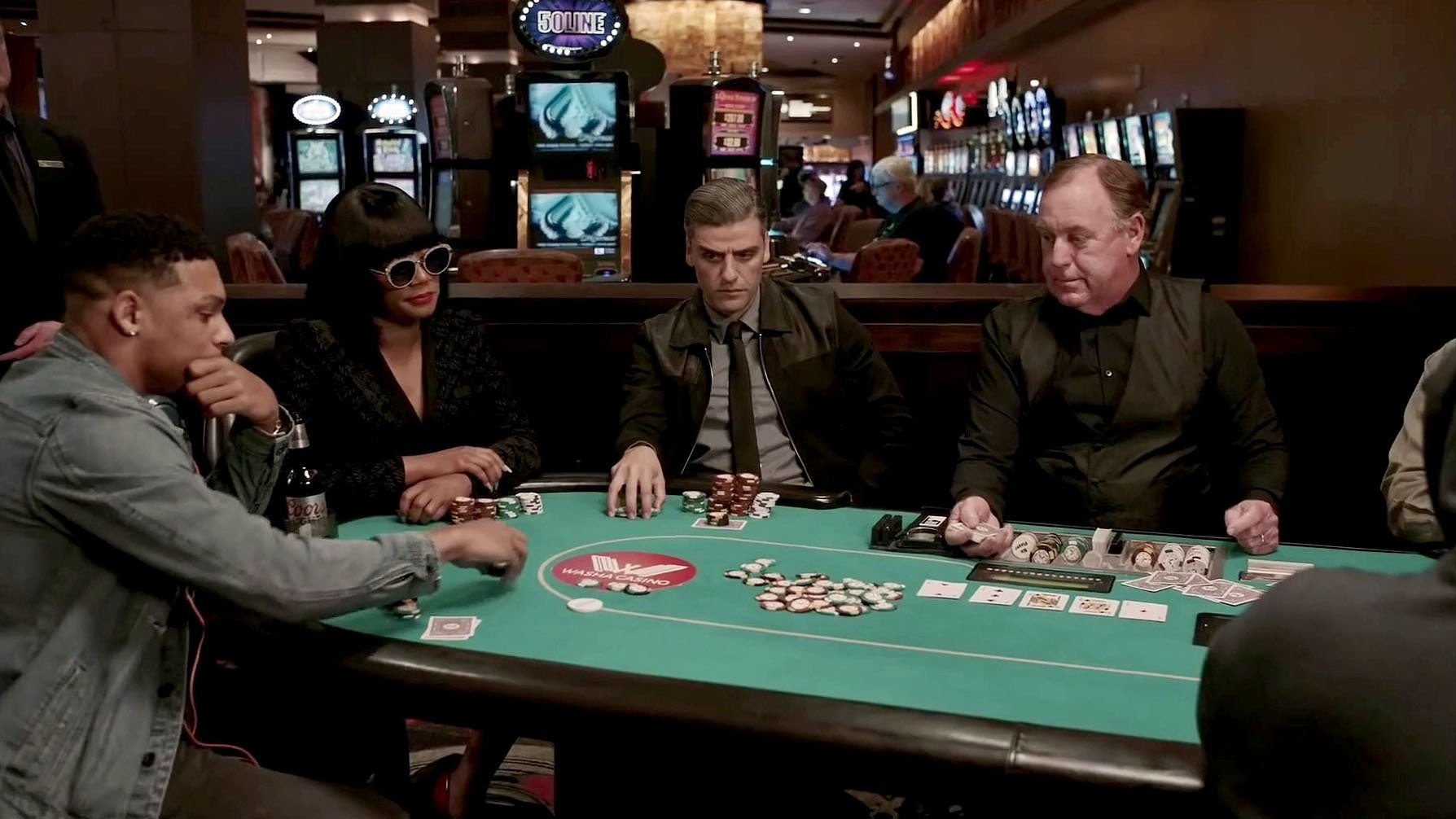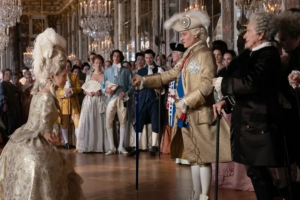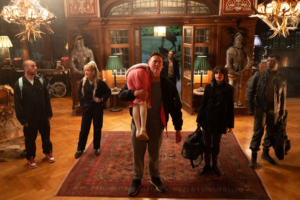Reviewed by GREG KING
Director: Paul Schrader
Stars: Oscar Isaac, Tye Sheridan, Tiffany Haddish, Willem Dafoe, Alexander Babara, Adrienne Lau.

Unlike movies such as The Cincinnati Kid, California Split, or Rounders, where the focus was on the card games, The Card Counter is not a film about poker per se, as writer/director Paul Schrader is more interested in exploring his central protagonist and darker themes of guilt and retribution. Schrader has a pretty misanthropic view of man as is evidenced in many of his films, from Taxi Driver through to his recent First Reformed. Many of his central characters are brooding, deeply flawed, obsessive and often traumatised by their past and seeking some form of redemption. And here again he is exploring familiar themes.
Schrader’s latest such character is William Tillich (played by Oscar Isaac, currently also in Dune), a former soldier who has spent time in a military prison for reasons we learn about later. While in prison he preferred the isolated and well-structured routines. He also taught himself to count cards. On release he travels around to various casinos and poker tournaments and uses his skill to win small amounts so as not to attract untoward attentions to himself. In a detailed voiceover he gives the audience insights into many of the tricks of counting cards and avoiding detection from the casino overseers. His main nemesis on the tournament circuit is the brash Ukrainian born poker player Mr USA (Alexander Babara) who drapes himself in the stars and stripes, which becomes a metaphor for some of the more overt corruption in contemporary America.
And while playing cards is part of the drama, the real story follows a darker arc and is something of a muted revenge thriller. As he travels from one nondescript, bland small hotel to another, William covers the furnishing in bland white sheets and hides the paintings, to give the familiar bleak pristine look of a prison cell.
William meets three people who will shape his destiny. There is La Linda (Tiffany Haddish), a gambler who has created a syndicate of investors who provide the finance for players to compete in tournaments and she recruits him hoping to take him to the WSOP tournament in Las Vegas. John Gordo (Willem Dafoe) is a shadowy former civilian consultant to the military who now runs a successful security company and is delivering a lecture in security technology and the latest techniques in identity recognition software at the convention center at one of the casinos William visits in Atlantic City. And there is Cirk Baufort (Tye Sheridan, from Ready Player One, etc) a surly angry young man who is seeking revenge on Gordo as he believes that he is responsible for his father’s behavioural problems before committing suicide.
William has a shared history with Gordo through his past as an interrogator using “enhanced interrogation techniques” at Abu Ghraib prison. When the investigation was launched into the controversial practice, top ranking officials like Gordo vanished, leaving soldiers like William to shoulder the blame. But William decides to take Cirk under his wing and steer him away from thoughts of revenge. He takes Cirk along on the poker tour, and even offers to finance his return to college and pay off all his debts, in the hope of finding peace and redemption for himself.
But this is a Schrader film, and anyone who has seen those films he has written like the classic paranoid thriller Taxi Driver or the gritty urban drama of Hardcore, etc, will know that William is unlikely to find peace or redemption easily. Schrader has a stark minimalist style and he directs the material with remarkable restraint, particularly in the final confrontation between William and Gordo which is largely understated. There is a distinct lack of urgency to proceedings.
Isaac has a brooding and intense presence and delivers a stoic, tightly wound and largely internal performance as the psychologically damaged William, a loner who is haunted by his past but manages to keep his emotions largely in check. Haddish, who is better known for her roles in raunchy and largely unfunny comedies like Girls Trip and Night School, etc, is cast against type in a more dramatic role, but her character is underdeveloped. And she shares an uncomfortable chemistry with Isaac. Sheridan brings a nervous energy to his role as the troubled young man.
Production designer Ashley Fenton has done a great job of recreating the interiors for the casino scenes, with the drab interiors of the poker rooms offering a stark contrast with the bright lights and artificial lights of the poker machines.
The Card Counter has been shot in crisp, cold style by cinematographer Alexander Dynan, who collaborated with Schrader on First Reformed, and he uses much the same style here which reinforces the rather bleak tone and gives the material a sense of foreboding. Some of the scenes in which William plays cards at the casino were shot inside an actual casino in Biloxi, which lends authenticity to the material. Dynan also uses a wide-angle fisheye lens to heighten the disturbing events in Abu Ghraib and to deliberately distort the characters physically, and unsettling audiences at the same time with its abrasive imagery.
★★★



